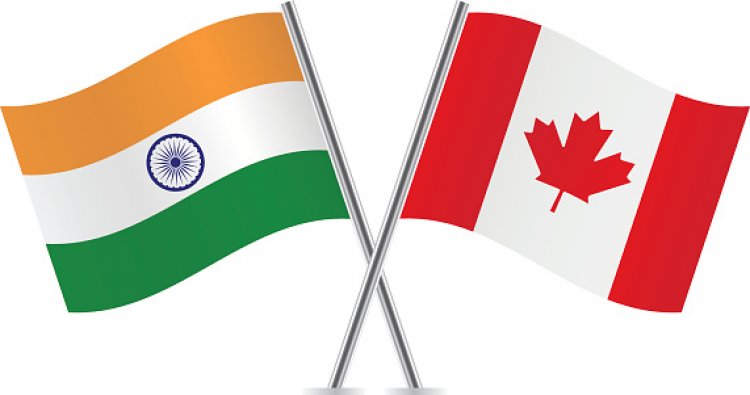India - Canada: Growing Reputation of Canada as a ‘Safe haven for Terrorists….”
STORIES, ANALYSES, EXPERT VIEWS

Canada said Thursday it had withdrawn 41 diplomats from India - fallout from a bitter row over the killing of a Sikh separatist on Canadian soil.
New Delhi planned to revoke diplomatic immunity for all but 21 of Canada’s diplomats and their families by Friday, forcing Ottawa to pull out the others, Foreign Affairs Minister Melanie Joly said. “Revoking the diplomatic immunity of 41 diplomats is not only unprecedented, but also contrary to international law,” Ms. Joly said Wednesday, but said Canada did not plan to retaliate in kind, so as to not “aggravate the situation.”
Ottawa also expelled an Indian diplomat over the affair.
Relations between the two countries have plunged since Prime Minister Justin Trudeau last month publicly linked Indian intelligence to the killing of Canadian citizen Hardeep Singh Nijjar, which New Delhi has denied.
Canada’s call for cooperation in the investigation: Canada has called for India to cooperate in the investigation but New Delhi has rejected the allegations and taken countermeasures, such as shutting down visa services for Canadians.
External Affairs Minister S. Jaishankar said last month that India would be willing to examine any evidence presented by Canada. “We have actually been badgering the Canadians. We’ve given them loads of information about organized crime leadership which operates out of Canada,” Jaishankar said, referring to Sikh separatists. “We have a situation where actually our diplomats are threatened, our consulates have been attacked and often comments are made (that are) interference in our politics,” he said.
Nijjar wanted a separate Sikh state (Khalistan)
Nijjar, who advocated for a separate Sikh state carved out of India, was wanted by Indian authorities for alleged terrorism and conspiracy to commit murder. Nijjar, immigrated to Canada in 1997 and became a Canadian citizen in 2015, was shot dead by two masked assailants in the parking lot of a Sikh temple near Vancouver in June.
Canada is home to some 770,000 Sikhs, who make up about two percent of the country’s population, with a vocal group calling for creating a separate state of Khalistan. Hundreds of Sikh protesters rallied outside Indian diplomatic missions in Canada last month, burning flags and trampling on pictures of Indian Prime Minister Narendra Modi.
In contrast, the Sikh separatist movement is largely finished within India, where security forces used deadly force to put down an insurgency in the state of Punjab in the 1980s.
Tensions between Ottawa and New Delhi have created a delicate situation for close Canadian ally Washington, which has in recent months taken steps to move closer to India as the United States seeks to limit Chinese influence in the region.
Canada has a ‘growing reputation of a safe haven for terrorists, for extremists and for organised crime’
The recent statement by India that Canada has a “growing reputation of a safe haven for terrorists, for extremists and for organised crime” and that “they are being politically condoned” has brought the issue of terrorism back into focus. According to T S Trimurthi (former Indian Ambassador to the UN in New York) "we are now witnessing four broad, dangerous trends in international terrorism.” Three of these are of relevance to India.
Fragmented of fight against terror: The first is that the “global fight against terror is getting increasingly fragmented after two decades of opposing it collectively……Before 9/11, the world was divided into….’your terrorist' and ‘my terrorist’. But 9/11 proved that nobody was immune to terror and it soon became a fight against ‘our terrorists’. Twenty years on, we are in danger of drifting back.”
The most dangerous example of this fragmentation writes Trimurti “is Canada. It has implied that ‘our terrorists’, which are Khalistani terrorists on their soil, are ‘not their terrorists'. Ottawa is, in effect, going on the dangerous path of legitimising terrorism by not recognising it.
Emerging technologies for terrorists’ purposes: Another “trend relates to new and emerging technologies for terrorists’ purposes. The landmark Delhi Declaration on Countering the Use of New and Emerging Technologies for Terrorist Purposes of October 2022 brought to the fore three key areas — countering terrorist exploitation of information and communication technologies; threats posed by terrorists’ use of unmanned aerial systems (drones); and countering the financing of terrorism.
Proliferation in online activities, social media, misuse of AI, synthetic biology and 3D printing, modern fundraising, payment technologies, etc, are being used for recruitment, radicalisation and committing terror.
Politicisation of religiophobias: The other contemporary trend, writes Trimurti “relates to the politicisation of religiophobias to justify terror….The use of Islamophobia as an excuse or justification to condone terror is worrying. This was evident in the way Pakistan blocked India’s amendment to the draft text of the 2023 Global Counter Terrorism Strategy (GCTS) adopted at the UN in July by threatening to introduce a reference to ‘Islamaphobia' in the text. This addition would have provided Islamophobia as a justification for terrorist acts. India refused to compromise and disassociated itself from the entire GCTS 2023 and charged that the ‘arbitrary’ move to ‘pick and choose’ was disturbing and uncalled for.
“This fight against religiophobia is also selective. There has been a lack of recognition of the growing attacks and hatred against non-Abrahamic religions, including against Hindus, Sikhs and Buddhists. The continuing attacks on temples and gurdwaras, forcible conversion of minority communities in Pakistan and our neighbourhood are well known. This hatred has spread to the West, including to the US, Australia, the UK and Canada, with even the PM and the External Affairs Minister being compelled to take the issue up with their counterparts. It is far more extensive than is believed.”
Dangerous trends in Canada: In Canada, writes Trimurti “three pernicious forces have come together — terrorism, Hinduphobia and separatism. As India said, Canada nurtures ‘politically condoned hate crimes’. This has serious implications for a multicultural, pluralistic and democratic country like India.”
















